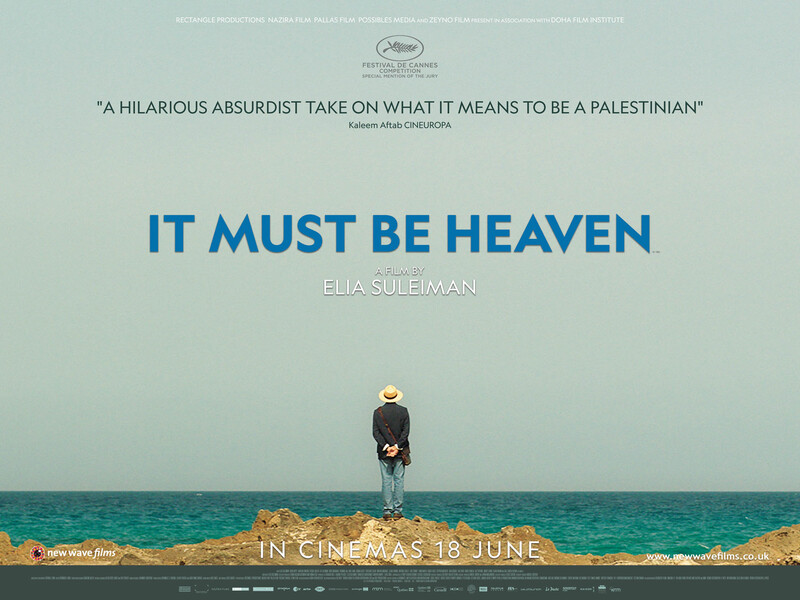
Review by
Benjamin Poole
Directed by: Elia Suleiman
Starring: Elia Suleiman, Ali Suliman, François Girard, Gael García Bernal, Nancy Grant, Guy Sprang, Stephen McHattie

Within the multi-faceted narrative of Marvel comics, there is a character
called The Watcher. An extra-terrestrial being who essentially looks like
a big massive baby in a blue robe, Uatu’s role within the comics is to
passively observe and record significant moments in the Marvel universe.
So, you know, he rocks up when Galactus threatens the planet, or that time
when Black Panther and Storm got married (power couple!). The Watcher’s
dictum is closely adhered to: ‘Whatever transpires, I will remain true to
my charge, and observe all that occurs’; occurrences which are usually of
monumental cosmic significance.
Imagine, though, if The Watcher wasn’t a huge alien infant, but was
instead the fragile form of Palestinian filmmaker Elia Suleiman.
Instead of purposefully appearing at major moments within an overarching
fictional narrative, he drifts across a twee representation of the globe
in order to arrive in New York to meet regarding finance for his new film.
Then swap the mute surveillance of cosmic happenings for the nebbish
Suleiman silently watching wry moments of human interaction which have
subtly symbolic relevance to the situation in the Middle East, and you’ve
got It Must Be Heaven.

A quick scan of reviews for It Must Be Heaven give a
positive reaction for this film, but one word of caution does seem to
persist: ‘patience’. You need ‘patience’ for this film, as the quizzical
Suleiman watches his neighbour help himself to lemons from the tree in our
hero’s yard; as the plaintive Suleiman sits across from twin brothers in a
bar complaining about their order; while the stoic Suleiman watches some
bloke take a piss against a wall.
Should watching a film necessitate the audience possess a quality which is
so rarefied Western religion holds it up as near to saintliness? If you’re
part of the so-called MTV generation then this film is going to end up a
bit of a slog, a cinematic stare out competition as the silent Suleiman
endlessly wanders through empty cityscapes to look at, for instance, a
couple of road sweepers playing an ersatz game of golf with their brushes
and some trash.

Like the recurring motif of militarism (tanks thundering about
occasionally in the background, men marching) which threads throughout the
film, the scene of the chap having a slash against the wall is indicative
of the film’s whimsical symbolism. In the foreground some police harass an
innocent man, while this micturate act of civil disobedience is ignored
within the same frame. Those who enact the law are flawed, and are duly
committed to harassment, rather than safeguarding. Police are ubiquitous
in It Must Be Heaven. We see them prancing about in formation upon segways, and, more
sinisterly, driving alongside the vacant Suleiman on the highway with a
blindfolded woman in the back. Authority is both menacing and frivolous in
It Must Be Heaven’s sledgehammer ideologies.
Could this last scene be a comment on how women in Palestine are cut from
political and personal discourse? It is difficult to tell, as the imagery
in It Must Be Heaven is poetic rather than polemic. Abstract
and suggestive, not direct and demonstrative. And, anyway, the portrayal
of women is at times a bit cringe otherwise. We see the deadpan Suleiman
checking out a parade of admittedly very fit women of all creeds and
colours while at a Parisian café with Nina Simone playing on the
soundtrack. It's meant to be cute, but to me it seemed a bit improper.
Just as when the gawping Suleiman spies on various women going about their
business from his hotel room. The sedate Suleiman is like a boater wearing
Brian De Palma character who unfortunately just ends up voyeuring a
cleaner or someone watching television instead of something interesting
like shagging or a murder.

Within his body of film, critics have likened the passive Suleiman to
Keaton or Tati. However, the character which the slightly annoying
Suleiman, with his open-eyed double takes and pseudo-stoned
disassociation, reminded me most of was Kevin Smith’s Silent Bob, with all
his goonish muggings. Just as with that character, the shtick here also
wears a bit thin.
Nonetheless, it is clear why It Must Be Heaven was warmly
received at Cannes 2019. There is a mannered, neat artistry to the
photography, and an immersion evident especially in the early ‘lemon
stealing’ tableaus where you can almost feel the warm Nazarene breeze soft
lifting the citrus scents. The imagery is precociously absurdist, the
abstracted narrative clever-but-not-too-clever. Plenty to like, I suppose.
But, of all the hundreds of four colour chancers who were published and
pulped, I think there is a reason why the perennially backgrounded The
Watcher never starred in a comic-book of his very own.

It Must Be Heaven is in UK/ROI
cinemas from June 18th.

